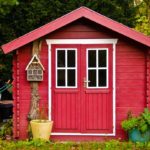Unless your outdoor equipment is powered by Bluetooth, you’re going to need an outdoor extension cord to reach a power outlet.
You may purchase an extension cord by just looking at the length. Nevertheless, other factors such as gauge and amperage rating are crucial to acknowledge.
That way, you’ll be practicing better safety measurements while operating your outdoor machinery.
Stick around to learn more about outdoor extension cords and the best options available in the market.
3 Best Outdoor Extension Cords
The good news is that numerous options for outdoor extension cords are available. Luckily, we’ve narrowed it down to our top picks and customer bestsellers. Check them out below.
1. Woods 0723 Extension Cord

When it comes to extension cords and electric products, Woods is a well-known brand. Its 0723 model is a medium-duty extension cord built with a 16-gauge wire, carrying 13 amps.
This cord is double-pronged, which doesn’t make it suitable for heavy-duty motorized machinery. Instead, it’s ideal for electric hedge-trimmer and leaf-blowers.
Additionally, it can be used to power fans, stereos, and other small household tools.
Length-wise the Woods 0723 comes at an impressive 50 ft extension. Plus, the bright orange coat is insulated with a highly protective vinyl cover.
Pros
- Long length
- Affordable
- Water-resistant layer
Cons
- Low power
2. Southwire Extension Cord

Founded in 1950, Southwire is a notable name in the extension cord industry. Despite its 50 ft length, this outdoor extension cord doesn’t disappoint in power.
It contains a 12-gauge wire holding about 15 amps and 120 volts. These high-powered features make this cord perfect for heavy-duty machinery.
The Southwire outdoor extension cord can charge chain saws, circular saws, and grinders.
Apart from that, the cord is three-pronged, making it a grounded and safer option. Once it’s on, the socket end will light up.
The outdoor extension cord comes in a yellow jacket layer made of vinyl. It protects the inner wire from harsh sunlight, rain, and abrasion.
Pros
- High-power capacity
- Long length
- Three-pronged grounded plug
Cons
- Can be pricey
3. Iron Forge Extension Cord

The Iron Forge extension cord is one of the most highly-powered options on this list. It has a large 10-gauge wire that conveys 15 amps and 125 volts.
On top of that, it comes in a wide variety of lengths, ranging from 3 ft. to an exceptionally long 200 ft.
This yellow-jacketed Iron Forge model can power extra heavy-duty devices. For example, you can use it for rotary hammers, compressors, generators, and recipro saws.
The outdoor extension cord is three-pronged and grounded to follow safety measures. The main struggle with this cord is that it can be heavy to carry around. Plus, it’s more pricey than other cords on the market.
Pros
- Heavy-power usage
- Versatile length options
- Three-pronged grounded plug
Cons
- Can be expensive
Buying Guide
Before taking your pick at an outdoor extension cord, it’s crucial to get a better idea of what you’re purchasing. You first may need to understand what kind of machinery you’ll be using and how far off is it from the power outlet.
For better reference, here’s a comprehensive buying guide to assist you.
Type of Extension
There are mainly two different types of extensions you can look at, namely, two-pronged and three-pronged. The prior is found in most extension cords.
Nonetheless, two-pronged extension cords could potentially be more dangerous since they’re not grounded. Grounded cords, as their name suggests, connect to grounded wiring below your home.
The purpose is to deflect excess power from the device and into the ground. On the other hand, three-pronged extension cords are grounded due to the extra cylindrical prong underneath the other ones.
We highly recommend using three-pronged cords if your device’s plug and outlet are three-pronged. That being said, most, if not all, heavy-duty outdoor extension cords are already three-pronged.
Amperage Rating
The amperage rating identifies the amount of electrical current that flows through the conductor. In the extension cord’s case, the conductor is the copper wire inside the insulation.
When picking an extension cord, you’ll need to look out for how many amps the conductor can carry. As a general rule, you can choose the same amount of amps as the machine you’ll be using.
If you use fewer amps, then the cord can potentially overheat due to excess amperage.
Length
The length is probably the first feature you’ll look at when browsing for an outdoor extension cord. Typically, you’ll want to look for a length that won’t stretch out too much to avoid any mishaps.
That being said, the longer the cord, the more voltage is likely to drop. The number of volts determines the strength of the electrical force carrying the amps through the conductor.
For that reason, you may need to pick a shorter extension cord if you require extra amp capacity.
Gauge
The gauge of the extension cord determines the capacity of the electric current that can flow in the wire. In other words, the gauge decides the amperage rating.
The standard American Wire Gauge in extension cords are 16, 14, 12, and 10-gauge. The higher the amount, the lesser the electric capacity of the wire.
That’s because the 16-gauge wire is thinner in diameter as opposed to the 10-gauge’s thicker diameter.
Generally, you’ll need a lower gauge rating if you’re using heavy-duty machinery that’s motor-powered.
Protection
The layer of protection or insulation around the cord also matters, especially in outdoor extension cords. To make sure that the extension cord is suitable for outdoor use, it should be marked with a “W” either at its end or side.
The insulating material for outdoor extension cords is usually composed of vinyl or heavy-duty plastic. This will help ensure maximum protection from harsh elements such as rain and sun.
Conclusion
Outdoor extension cords are a must-have in most households. Whether it’s to power your lawnmower or leaf blower, you need to choose the right option to avoid any electrical damage.
For that reason, choosing the right length, amperage rating, insulation, gauge, and extension type can make all the difference.
Fortunately, our buying guide can advise you on what you should be looking for in an extension cord. Once you purchase the cord, make sure to follow the manual’s guide and precautions to stay safe.





